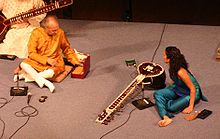
Ravi Shankar was an Indian sitarist and composer. A sitar virtuoso, he became the world's best-known expert of North Indian classical music in the second half of the 20th century, and influenced many musicians in India and throughout the world. Shankar was awarded India's highest civilian honour, the Bharat Ratna, in 1999. He is also the father of American singer Norah Jones.
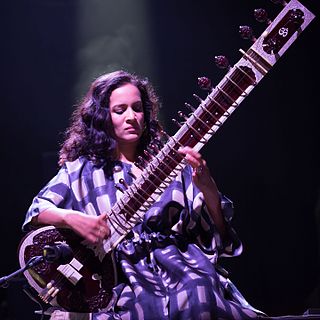
Anoushka Hemangini Shankar is a British-American sitar player and musician of Indian descent, as well as occasional writer. She performs across multiple genres and styles—classical and contemporary, acoustic and electronic. In addition to releasing seven solo studio albums beginning with Anoushka (1998), she has also worked alongside a wide variety of musicians, including Karsh Kale on the full-length collaboration Breathing Under Water (2007) and her father Ravi Shankar. She has received nine Grammy Awards nominations and was the first musician of Indian origin to perform live and to serve as a presenter at the ceremony. She was the youngest and first woman to receive a British House of Commons Shield.

Rise is an album by Anoushka Shankar released on 27 September 2005. The album was chosen as one of Amazon.com's Top 100 Editor's Picks of 2005 (#82). On previous recordings, Anoushka Shankar had followed in the footsteps of her father, Ravi Shankar, by performing relatively traditional, raga-based music. Rise, by contrast, incorporated jazz, pop, and pan-ethnic world music textures in an unpredictable melange. At the center of it all are Shankar's sitar expertise and traditional Indian roots.
Shubhendra Shankar, also known as Shubho Shankar, was an Indian graphic artist, musician and composer. He was the only son of musicians Annapurna Devi and Ravi Shankar.

Live at Carnegie Hall is a live album by Anoushka Shankar released in 2001, and recorded at Carnegie Hall in New York and at the Salisbury Festival. The album earned a Grammy nomination for Best World Music Album.
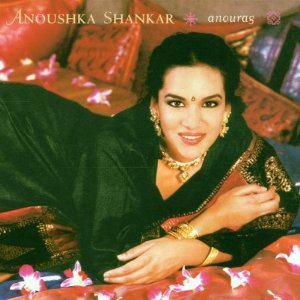
Anourag is an album of Indian classical music performed by Anoushka Shankar, released in 2000. Anoushka Shankar's father, sitar master Ravi Shankar, adapted six ragas for her to play on this album.
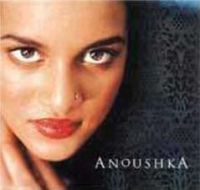
Anoushka is the debut album of British-American sitar player Anoushka Shankar, released in 1998. The pieces begin with a slow introduction of fluid rhythms and build in a crescendo to a spirited display of virtuosity with tabla accompaniment. Four of the album's five themes are based on ragas adapted by Ravi Shankar.

Aashish Khan Debsharma is an Indian classical musician, a player of the sarod. He was nominated for a Grammy Award in 2006 for the 'Best Traditional World Music Album' category for his album "Golden Strings of the Sarode". He is also a recipient of the Sangeet Natak Akademi Award. Besides being a performer, composer, and conductor, he is also an adjunct professor of Indian classical music at the California Institute of the Arts, and the University of California at Santa Cruz, in the United States.

Raga is a 1971 documentary film about the life and music of Indian sitarist Ravi Shankar, produced and directed by Howard Worth. It includes scenes featuring Western musicians Yehudi Menuhin and George Harrison, as well as footage of Shankar returning to Maihar in central India, where as a young man he trained under the mentorship of Allauddin Khan. The film also features a portion of Shankar and tabla player Alla Rakha's acclaimed performance at the 1967 Monterey Pop Festival.

Pandit Nayan Ghosh is an Indian tabla and sitar maestro. He is a tabla player from the Farrukhabad Gharana.
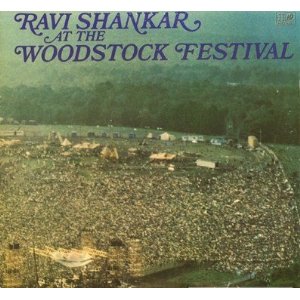
At the Woodstock Festival is a live album by Indian classical musician Ravi Shankar that was released in 1970 on World Pacific Records. It was recorded on 15 August 1969, during the first day of the Woodstock Festival in upstate New York. Shankar's set took place during a downpour and he later expressed his dissatisfaction with the event due to the prevalence of drugs among the crowd.

Ravi Shankar's Music Festival from India was an Indian classical music revue led by sitarist and composer Ravi Shankar intended for Western concert audiences and performed in 1974. Its presentation was the first project undertaken by the Material World Charitable Foundation, set up the previous year by ex-Beatle George Harrison. Long a champion of Indian music, Harrison also produced an eponymous studio album by the Music Festival orchestra, which was released in 1976 on his Dark Horse record label. Both the CD format of the Ravi Shankar's Music Festival from India album and a DVD of their performance at the Royal Albert Hall in London were issued for the first time on the 2010 Shankar–Harrison box set Collaborations.

Swara Samrat festival is a four-day annual festival of Indian classical music and dance held during the winters in Kolkata, India. This festival is the brainchild of Sarod maestro Pandit Tejendra Narayan Majumdar, his vocalist wife, Manasi Majumder and their Sarod player-son Indrayuddh Majumder. The festival is dedicated to Swara Samrat Ustad Ali Akbar Khan. Indian Classical Music and Dance Legends such as Pandit Shivkumar Sharma, Pandit Birju Maharaj, Pandit Hari Prasad Chaurasia,Legendary tabla player of Banares Gharana Pandit Kumar Bose,Pandit Jasraj, Ustad Zakir Hussain, Ustad Aashish Khan, Dr. Girija Devi, Begum Parveen Sultana, Pandit Swapan Chaudhuri, Guru Karaikudi Mani, Ustad Rashid Khan, Shankar Mahadevan, Pandit Budhaditya Mukherjee, Pandit Ulhas Kashalkar, Pandit Venkatesh Kumar, Pandit Ajoy Chakraborty, Pandit Anindo Chatterjee, Pandit Sanjay Mukherjee, Ustad Shahid Parvez, Ustad Shujaat Khan, Pandit Tejendra Narayan Majumdar, Pandit Kushal Das, Pandit Rajendra Gangani, Guru Sujata Mohapatra, Pandit Subhankar Banerjee, Pandit Yogesh Samsi, Pandit Bickram Ghosh, Pandit Tanmoy Bose and Kaushiki Chakraborty are some of the artists who have previously performed in this festival.

The Living Room Sessions Part 1 is an album by Ravi Shankar released in 2012 through the record label East Meets West. The album earned Shankar the Grammy Award for Best World Music Album.
Ratul Shankar is a percussionist and actor.

West Meets East is an album by American violinist Yehudi Menuhin and Indian sitar virtuoso Ravi Shankar, released in Britain in January 1967. It was recorded following their successful duet in June 1966 at the Bath Musical Festival, where they had played some of the same material.

Tana Mana is an album by Indian musician Ravi Shankar, originally credited to "the Ravi Shankar Project" and released in 1987. The album is an experimental work by Shankar, mixing traditional instrumentation with 1980s electronic music and sampling technology. Shankar recorded much of Tana Mana in 1983 with sound effects innovator Frank Serafine, but it remained unreleased until Peter Baumann, head of new age record label Private Music, became attached to the project. The album title translates to mean "body and mind".

Ravi Shankar: In Celebration is a compilation box set by Indian classical musician and composer Ravi Shankar, released in 1996 on Angel Records in conjunction with Dark Horse Records. The four discs cover Shankar's international career, from the 1950s to the mid 1990s, and include recordings originally released on the World Pacific, HMV, Angel, Apple, Dark Horse and Private Music record labels. Shankar's friend George Harrison compiled and co-produced the set, which was issued as part of year-long celebrations for Shankar's 75th birthday.

Collaborations is a four-disc compilation box set by the Indian classical musician Ravi Shankar and the former Beatle George Harrison. Released in October 2010 on Dark Horse Records, it compiles two studio albums originally issued on that label – the long-unavailable Shankar Family & Friends (1974) and Ravi Shankar's Music Festival from India (1976) – and Chants of India, first issued on Angel Records in 1997. Although all three albums were originally Shankar releases, for which Harrison served in the role of music producer and guest musician, both Shankar and Harrison are credited as artists on the box set. Each of the collaborative projects represents a departure from Shankar's more typical work as a sitarist and performer of Hindustani classical ragas, with the box set showcasing his forays into, variously, jazz and rock, Indian folk and orchestral ensembles, and devotional music.
Aayush Mohan is an Indian Classical Musician who plays the Sarod. He performs in the style of Maihar Gharana of Hindustani Classical Music. He is a four-time TEDx speaker and has worked towards creating cultural awareness in India. He frequently performs Jugalbandi(duet) with his brother Lakshay Mohan who is a Sitar player and the two are known as Mohan Brothers. Aayush Mohan and Lakshay Mohan are the first Indians to be invited to perform at the Grammy Museum, Los Angeles for the opening of the exhibition 'Ravi Shankar : A Life in Music'.

